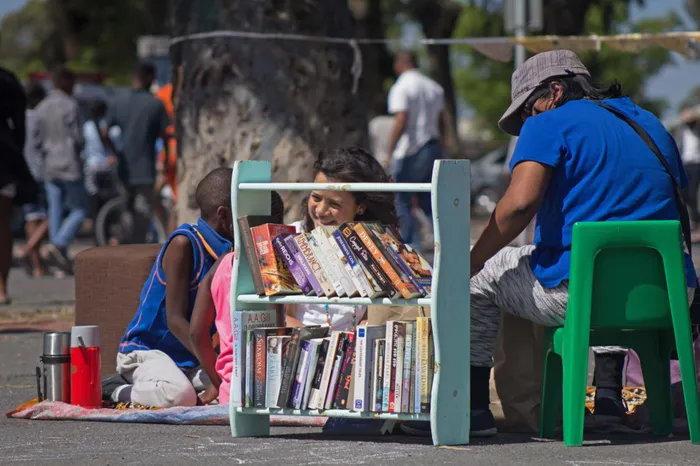Society angrier as we erect more elaborate barriers

CELEBRATING INTERACTION: Elle Gerber (centre) and Nicole Gangen read to children at the Book Station during the Social Innovation Festival in Langa on November 8. The writer talks about the value of creating positive memories in public spaces. Picture: RORY WILLIAMS CELEBRATING INTERACTION: Elle Gerber (centre) and Nicole Gangen read to children at the Book Station during the Social Innovation Festival in Langa on November 8. The writer talks about the value of creating positive memories in public spaces. Picture: RORY WILLIAMS
Rory Williams
Waking up on Saturday morning to news of another round of bomb blasts, followed by the predictable stream of commentary, my immediate reaction was to avoid it.
I was first old enough to be aware of terrorism in the 1970s, when airplane bombings shocked me, and the story of media heiress Patty Hearst’s role in terrorism captivated me with the notion that “normal people” could carry out violent acts for a cause.
Terrorists were not normal, they were animals. Only later did it dawn on me that soldiers, who are “normal people” commissioned to protect society, undergo a degree of dehumanising as preparation for killing a nation’s enemies. They are deliberately exposed to degrading situations and learn to see their enemies as inferior. Later still, I read arguments that countries like the US are themselves terrorising others, and that violence breeds more violence – arguments that resurface with every new incident. None of this has ever felt like it affects me personally. I have never felt at risk of being a bomb blast casualty. Certainly there are South Africans who have not only feared that, but experienced it.
I am not one of them. But of course, on some levels, we can’t avoid the fear and dehumanising effects of increasing violence in society. And I wonder how we can reverse the trend, or if it is even possible in an increasingly crowded world with diminishing resources. I grew up reading Dr Seuss’s children’s stories. They started my lifelong enjoyment of reading and writing, and thus helped shape who I am.
It is often nostalgia for childhood memories that leads successive generations of parents to read Dr Seuss to their children, making him the most-read children’s author of all time. And that, I feel, is a key to the perpetuation of beliefs and actions.
When we experience something positive and satisfying, we value it and we respect whoever or whatever allowed us that experience. We’ll overlook or justify shortcomings for the sake of the positive. No doubt a psychologist will explain our motivations differently, but that is my interpretation.
I think that is how people can defend what others think is indefensible, like when a public figure is excused for a misdemeanour on the grounds that “he is such a good person”.
I think if we want to break negative and destructive cycles, and replace them with positive and creative ones, we need to create experiences that we want to cherish and share. In addition to reading, many of my strongest memories are from outdoor settings. Some are unpleasant, like being pushed around by bored teenagers who found it entertaining to scare a 10-year-old kid. But the scary bits didn’t put me off – I loved the adventure of exploring the city as a child, and I still do.
I excused the city’s shortcomings, because there was so much else on offer. And mostly the offering was the people and activities that the city supported in so many different ways. Now, it strikes me that there is a parallel between the way cities are shutting down the things that allow us to enrich our lives and the way we are getting less tolerant and more strident in how we seek attention.
Of course I can’t blame urban design for terror attacks or violent student protests, but something tells me we should be looking for connections. Is it a coincidence that society is more easily prone to anger as we erect more elaborate barriers between private and public space?
Where are the outlets for creative energy and the birth of positive memories? When we use more stringent rules, higher walls and greater surveillance to manage the spaces we use, we teach people that they are not to be trusted, and so we learn to be untrustworthy.
More of our positive experiences are in private or highly curated environments, when we need to be building life-affirming memories of public life, where we learn to tolerate and celebrate our differences through interaction.
@carbonsmart